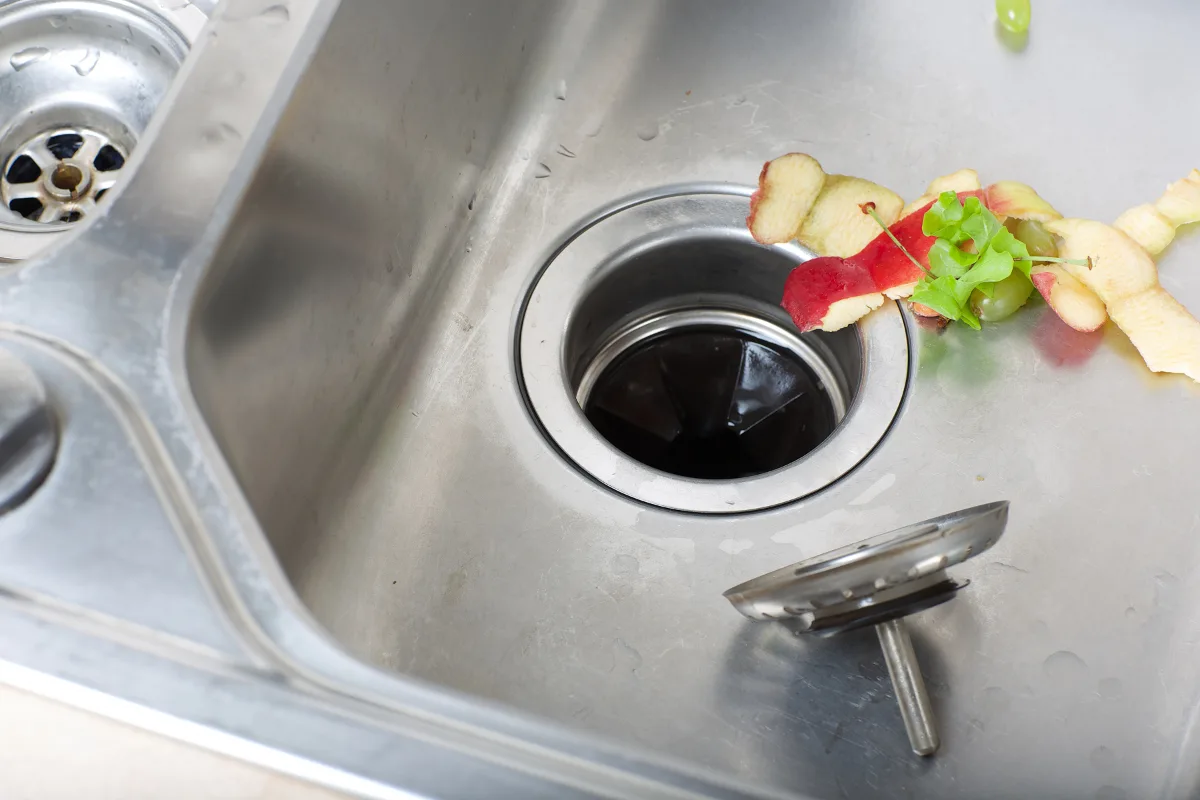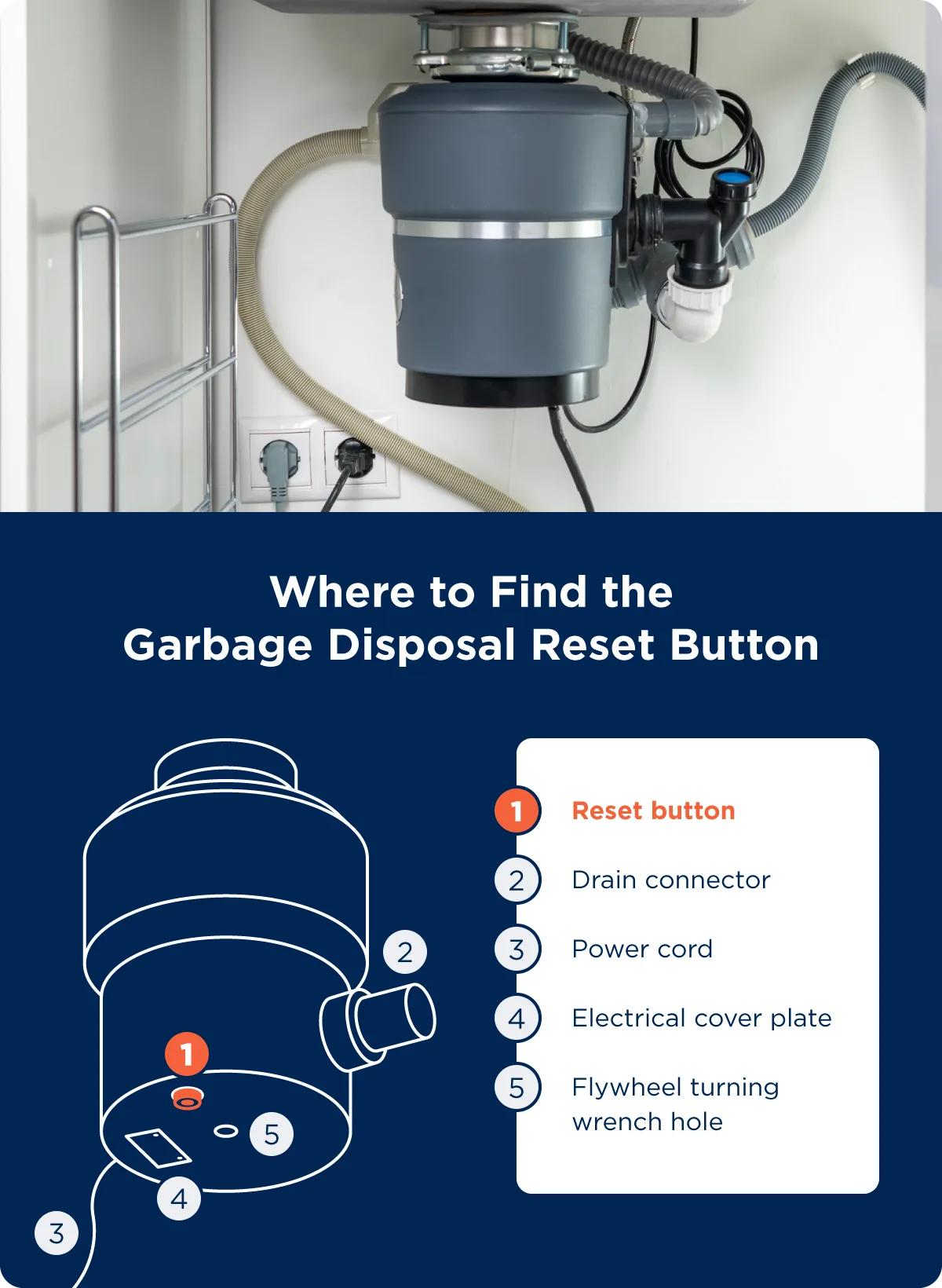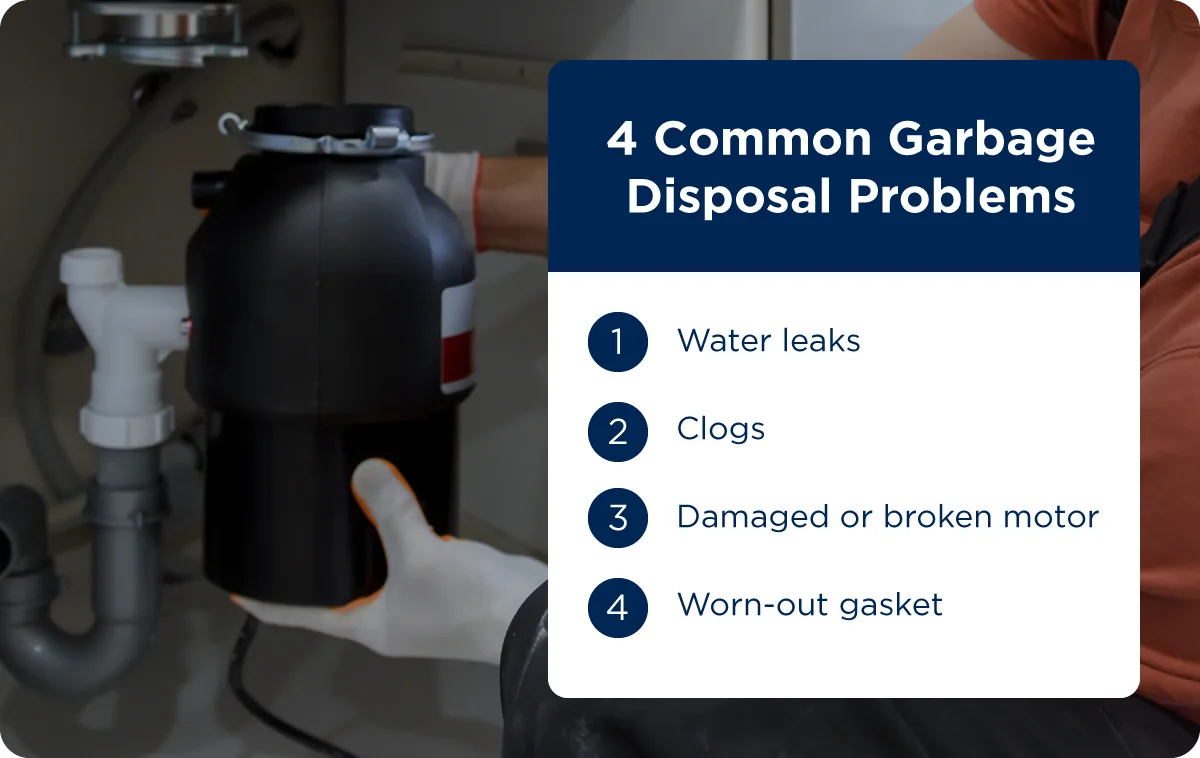Garbage Disposal Not Working? Here’s What to Do

A garbage disposal is a crucial kitchen workhorse designed to grind up food scraps and prevent clogged drains. While we often take this modern convenience for granted, a malfunctioning garbage disposal can quickly become a source of frustration and unpleasant odors.
If you find your garbage disposal not working, or it turns on but won't spin, there are a few solutions that can help restore the performance and efficiency of the unit. Read on to learn a few of the most common garbage disposal issues, how to fix them, and when to call a professional.
1. Check the Outlet
The first step in diagnosing a broken garbage disposal is to check the outlet. It may seem obvious, but sometimes the problem is as simple as a loose plug or a tripped circuit.
Begin by unplugging the disposal from the electrical outlet and then plugging in another appliance to see if the outlet functions correctly. If the outlet is operational and your disposal is still not working, proceed to step 2.
2. Reset the Garbage Disposal
Most garbage disposals are equipped with a reset button, usually located on the bottom of the appliance. If your disposal stopped working due to an overload, jam, or other minor issue, pressing this reset button can often resolve the problem:
- Check that the disposal is powered off and unplugged for safety.
- Find the reset button on the bottom of the unit and press it. If it clicks or pops back out, this indicates a successful reset.
- Plug the disposal back in and power it on. Be cautious and avoid putting your hands or any foreign objects into the disposal during this process.
If the reset doesn't work and the unit remains unresponsive, you may need to move on to more advanced troubleshooting steps. This can help you identify and address the underlying issue causing your garbage disposal to malfunction.
3. Look for Jams or Leaks
When dealing with jams or leaks in a garbage disposal, safety should always be your top priority.
Jams can be caused by foreign objects or debris obstructing the grinding mechanism. To check for jams:
- Start by ensuring the disposal is turned off and unplugged.
- Shine a flashlight into the disposal to locate any foreign objects or debris that may be causing a blockage.
- If you spot something, use long-handled pliers to carefully extract it, avoiding any direct contact with your hands.
Leak detection requires a visual inspection of the disposal's connections. To check your garbage disposal for leaks:
- Make sure the unit is off and disconnected from power.
- Check the seals, connections, and pipes for signs of water leakage.
- If you find a leak, it's best to consult a professional plumber or a certified technician, as attempting to fix a leak without the right knowledge and tools can lead to further damage or personal injury.
It's crucial to remember that tampering with a garbage disposal can be hazardous. In situations where the solution is too complex or dangerous, contacting a garbage disposal repair professional is strongly recommended to minimize any risks.
4. Check the Main Breaker Box
Is your garbage disposal not turning on at all? Check for tripped circuit breakers in your home’s main breaker box. If you find a breaker in the "off" position, flip it to the "on" position to restore power to the disposal and see if it resolves the issue.
5. Contact a Professional
If you've exhausted all the previous steps and your disposal still isn’t functioning properly, it's a clear sign that the issue may be more complex—or potentially dangerous.
At this point, attempting to fix a serious issue—such as a motor malfunction or a severe clog—without the necessary knowledge and tools could lead to further damage or injury. A professional plumber or technician has the expertise and equipment to diagnose and repair the problem safely and efficiently.
By reaching out to a professional, you can ensure the long-term functionality of your garbage disposal and often save yourself from more extensive and costly repairs in the future. Mr. Appliance’s professional repair technicians can provide timely garbage disposal repairs or replacements so you can get back to enjoying the heart of your home.
Common Garbage Disposal Issues
Your garbage disposal has a limited number of components that work together harmoniously, but if one or more should become stuck, clogged, or damaged, you'll need to determine the source of the issue to resolve it. Common garbage disposal issues include:
Water Leaks
Damaged seals, loose connections, or cracked pipes can lead to water leakage around the disposal. The most common areas for leakage to occur are at:
- Sink flange
- Dishwasher connection
- Discharge drainpipe
If you possess the necessary tools, you can try tightening the connections at any of these points after disconnecting the power to the unit at the breaker box.
Clogs
Accumulated food scraps, grease, or other debris in the disposal or drain pipe can cause clogged garbage disposals. These blockages lead to slow drainage, foul odors, and malfunctioning disposal.
To access and clear the clog, you will likely need to disassemble the drain trap and discharge pipe to remove the waste buildup. You should perform regular maintenance, such as running cold water while operating the disposal and avoiding putting hard or fibrous materials inside it, to prevent clogs and keep your disposal running smoothly.
A Damaged or Broken Motor
A damaged or broken motor is a significant issue that can render a garbage disposal inoperative. Signs of motor problems include:
- The disposal makes a humming sound without grinding
- Frequent overheating
- Complete failure to start
If you’re experiencing any of the above, it's best to contact a professional technician, as motor repairs can be complex and potentially dangerous for inexperienced individuals. In some cases, replacing the motor may be the most cost-effective solution.
A Worn-Out Gasket
Over time, the rubber gasket that seals the disposal unit to the sink may degrade or develop cracks, allowing water to escape. Replacing the gasket is a relatively straightforward repair, but it's essential to ensure a proper seal to prevent future leaks and water damage.
Types of Garbage Disposals
There are two primary types of garbage disposals: batch feed and continuous feed disposals. While both serve the same purpose of grinding food waste, they operate differently with their own advantages and considerations.
Batch Feed
Batch feed disposals operate by loading a batch of food waste into the unit, sealing it with a cover, and then activating the disposal. The cover is a safety measure, ensuring that you can only turn on the unit when it's securely sealed to reduce the risk of accidental activation.
Pros:
- Less likely to cause accidents
- Quiter
- Less prone to objects accidentally falling in and jamming
Cons:
- Less convenient for processions large volumes of waste
- Slightly more expensive
Continuous Feed
Continuous feed garbage disposals are the more common and traditional type of waste disposal units. These disposals operate continuously as long as they are switched on, allowing you to feed food waste into the unit while it is running. You will often control these with a wall switch or an air switch, and they offer a more efficient and convenient method for disposing of waste than batch feed disposals.
Pros:
- More efficient at disposing of large amounts of food waste
- Generally more budget-friendly
- Better suited for large households with heavy kitchen use
Cons:
- Higher risk of accidental activation
- This may be a concern in households with children
- Noisy
What If My Garbage Disposal Is Humming But Not Working?
If the garbage disposal won't grind, but you hear a humming noise when you turn the unit on, the inner flywheel is likely jammed, or the motor bearing has ceased.
When this occurs, it is imperative that you turn off the unit quickly to prevent further damage. Turn off the power to the unit at the breaker and wall switch to prevent injury before attempting to free the flywheel using any of the methods below:
- Take the offset wrench that came with the disposal and place it inside the flywheel turning hole at the base of the unit.
- Turn the wrench clockwise until you feel the flywheel turn freely.
- Alternatively, insert a wooden spoon handle into the drain opening and try to dislodge the flywheel.
- You can also shine a bright light into the drain opening to see if any debris, such as a bone, has caused a jam, and remove the object using tongs or pliers.
- Once you find a resolution, flip the breaker and push the reset button at the base of the disposal before turning it on.
Frequently Asked Questions
Whether you're a first-time disposal owner or seeking solutions to specific problems, read on for answers, tips, and expert guidance on how to make the most of your garbage disposal and tackle any challenges that may arise.
Why Did My Garbage Disposal Suddenly Stop Working?
If your garbage disposal has suddenly stopped working, there can be a number of reasons behind this unexpected shutdown.
The most common cause is an overload or jam, where foreign objects or a buildup of food scraps obstruct the grinding mechanism or cause slow drainage. In such cases, the disposal's safety feature triggers a shut-off to prevent damage or motor burnout. To address this, you can press the reset button on the disposal unit, ensuring it's unplugged and powered off.
If that doesn't resolve the issue, it could be an electrical problem, a faulty switch, or a damaged motor, in which case it's advisable to consult a professional technician for a thorough diagnosis and repair.
How Do I Fix an Unresponsive Garbage Disposal?
If your garbage disposal isn't responding when you turn it on, follow these steps to troubleshoot and potentially resolve the issue.
- Ensure the disposal is unplugged to avoid accidents. Check the electrical outlet and the main breaker box to make sure power is reaching the unit.
- Test the outlet. If it works, try pressing the reset button on the disposal unit, which can address issues caused by overloads or jams.
- Inspect the wiring and switch to identify any loose connections or potential electrical problems if the reset doesn’t work.
For a comprehensive diagnosis and repair, especially if the issue is complex or related to the motor, it's advisable to contact a professional technician to ensure the safety and long-term functionality of your garbage disposal.
How Do I Know If My Garbage Disposal Motor Is Burned Out?
If your disposal is unresponsive, emits a humming sound without grinding, or frequently overheats and shuts off, these can be signs of a damaged or burned-out motor.
In such cases, it's essential to first unplug the disposal and ensure it's powered off to prevent accidents. Once it’s safe, you can attempt to reset the disposal using the reset button, which might resolve some motor-related issues.
If the problem persists, it's best to contact a professional technician for a thorough diagnosis, as motor repairs can be intricate and dangerous for inexperienced individuals.
What is the Life Expectancy of a Garbage Disposal Motor?
The life expectancy of a garbage disposal motor depends on various factors, including the quality of the unit, how frequently you use it, and how well it's maintained.
On average, a good-quality disposal motor can last anywhere from 10 to 15 years or more with proper care. Performing routine maintenance—avoiding the disposal of hard objects, and fibrous materials, and regular cleaning—can significantly extend the motor's lifespan.
How Mr. Appliance Can Help
When your garbage disposal isn't working as it should, it's crucial to address the issue promptly to maintain a smoothly functioning kitchen. Whether it's a simple jam, an electrical glitch, or a more complex motor problem, understanding the common causes and troubleshooting steps can save you time and money.
However, it's essential to remember that a malfunctioning garbage disposal may also be a symptom of a larger plumbing problem, so seeking professional assistance is often the wisest course of action to ensure your kitchen runs efficiently and your home remains free from potential plumbing issues.
Contact your local Mr. Appliance today for expert appliance repair near you.
 Click to call
Click to call


